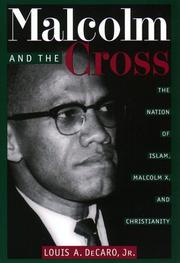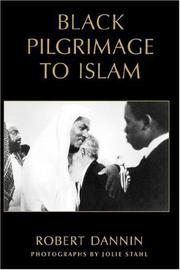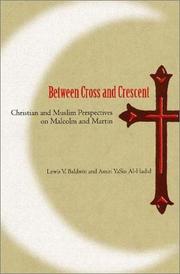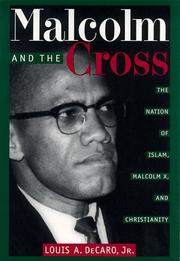| Listing 1 - 10 of 28 | << page >> |
Sort by
|
Object
ISBN: 0873480864 Year: 1992 Publisher: New York : Pathfinder,
Abstract | Keywords | Export | Availability | Bookmark
 Loading...
Loading...Choose an application
- Reference Manager
- EndNote
- RefWorks (Direct export to RefWorks)

ISBN: 0814719325 Year: 1998 Publisher: New York / London New York University Press
Abstract | Keywords | Export | Availability | Bookmark
 Loading...
Loading...Choose an application
- Reference Manager
- EndNote
- RefWorks (Direct export to RefWorks)
Malcolm X --- religion and revolution --- the Nation of Islam --- Christianity --- spirituality --- biography --- activism --- Black Muslims --- Afro-Americans --- Islam --- black power

ISBN: 9780195300246 Year: 2002 Publisher: New York, NY Oxford University Press, Inc.
Abstract | Keywords | Export | Availability | Bookmark
 Loading...
Loading...Choose an application
- Reference Manager
- EndNote
- RefWorks (Direct export to RefWorks)
African American Islam --- African American religion --- modern Islam --- cross-cultural understanding --- African Americans --- Muslims --- slavery --- black activism --- black Muslims --- the Nation of Islam --- Islamic orthodoxy --- the assassination of Malcolm X
Book
ISBN: 9064456666 Year: 1993 Publisher: Berchem EPO
Abstract | Keywords | Export | Availability | Bookmark
 Loading...
Loading...Choose an application
- Reference Manager
- EndNote
- RefWorks (Direct export to RefWorks)
815 Geschiedenis --- 826 Imperialisme, Kolonialisme --- 841.1 Democratisering --- 842.1 Propaganda --- 844 Sociale Structuur --- 846.1 Etniciteit --- 847 Onderwijs --- 860 (Vredes)cultuur --- 881 Afrika --- 882.4 Noord-Amerika --- History of North America --- Sociology of minorities --- Political philosophy. Social philosophy --- #KVHA:Rassenkwesties; Verenigde Staten --- #KVHA:American Studies --- Malcolm X --- discriminatie --- geschiedenis --- Verenigde Staten --- am-vs 947.6 --- geschiedenis Verenigde Staten - historische figuren : 20e eeuw
Book
ISBN: 9783954892051 3954897059 9783954897056 3954892057 Year: 2014 Publisher: Hamburg, Germany : Anchor Academic Publishing,
Abstract | Keywords | Export | Availability | Bookmark
 Loading...
Loading...Choose an application
- Reference Manager
- EndNote
- RefWorks (Direct export to RefWorks)
This book tracks the evolution of Malcolm X from a racist, espousing the essentialist ideals of the Nation of Islam to a human rights activist, aware of the broader early 1960's struggle against imperial forces. Central to this was his strategic use of race to unite African-American initially and then the oppressed people in the world. Race was used as a strategy with the aim to abolish racial oppression. In the first chapter of this study we look at the constraints, most notably the white power structure, present in the United States during the mid-1960's which, on one hand gave form to Malcolm
African Americans --- Black Muslims --- X, Malcolm, --- Ḥajj Malik al-Shabāẓz, --- Hajj Malik el-Shabazz, --- Iks, Mālkūm, --- Little, Malcolm, --- Malcolm X, --- Malik al-Shabāẓz, --- Malik el-Shabazz, --- Shabāz, Mālik, --- Shabazz, el-Hajj Malik, --- Shabazz, Malik,
Book
ISBN: 1479846554 9781479846559 Year: 2019 Publisher: New York New York University Press
Abstract | Keywords | Export | Availability | Bookmark
 Loading...
Loading...Choose an application
- Reference Manager
- EndNote
- RefWorks (Direct export to RefWorks)
Since the 1950s, and especially in the post-9/11 era, Muslim Americans have played outsized roles in US politics, sometimes as political dissidents and sometimes as political insiders. However, more than at any other moment in history, Muslim Americans now stand at the symbolic center of US politics and public life. This volume argues that the future of American democracy depends on whether Muslim Americans are able to exercise their political rights as citizens and whether they can find acceptance as social equals. Many believe that, over time, Muslim Americans will be accepted just as other religious minorities have been. Yet Curtis contends that this belief overlooks the real barrier to their full citizenship, which is political rather than cultural. The dominant form of American liberalism has prevented the political assimilation of American Muslims, even while leaders from Eisenhower to Obama have offered rhetorical support for their acceptance. Drawing on examples ranging from the political rhetoric of the Nation of Islam in the 1950s and 1960s to the symbolic use of fallen Muslim American service members in the 2016 election cycle, Curtis shows that the efforts of Muslim Americans to be regarded as full Americans have been going on for decades, yet never with full success. Curtis argues that policies, laws, and political rhetoric concerning Muslim Americans are quintessential American political questions. Debates about freedom of speech and religion, equal justice under law, and the war on terrorism have placed Muslim Americans at the center of public discourse. How Americans decide to view and make policy regarding Muslim Americans will play a large role in what kind of country the United States will become, and whether it will be a country that chooses freedom over fear and justice over prejudice.
Political culture --- Political participation --- Islam and politics --- Muslims --- Political activity --- United States. --- André Carson. --- Cold War. --- Gamal Abdel Nasser. --- Humayun Khan. --- Islam. --- Islamophobia. --- Jordan. --- Kareem Khan. --- Linda Sarsour. --- Malcolm X. --- Nation of Islam. --- activism. --- anticommunism. --- assimilation. --- capitalism. --- democracy. --- discrimination. --- dissent. --- election. --- foreign policy. --- hajj. --- immigration. --- liberalism. --- nationalism. --- politics. --- racial integration. --- racism. --- socialism. --- war on terror.
Book
ISBN: 0520959981 9780520959989 9781322076102 1322076103 9780520279339 0520279336 Year: 2014 Publisher: Oakland, California : University of California Press,
Abstract | Keywords | Export | Availability | Bookmark
 Loading...
Loading...Choose an application
- Reference Manager
- EndNote
- RefWorks (Direct export to RefWorks)
Less than three months before he was assassinated, Malcolm X spoke at the Oxford Union-the most prestigious student debating organization in the United Kingdom. The Oxford Union regularly welcomed heads of state and stars of screen and served as the training ground for the politically ambitious offspring of Britain's "better classes." Malcolm X, by contrast, was the global icon of race militancy. For many, he personified revolution and danger. Marking the fiftieth anniversary of the debate, this book brings to life the dramatic events surrounding the visit, showing why Oxford invited Malcolm X, why he accepted, and the effect of the visit on Malcolm X and British students. Stephen Tuck tells the human story behind the debate and also uses it as a starting point to discuss larger issues of Black Power, the end of empire, British race relations, immigration, and student rights. Coinciding with a student-led campaign against segregated housing, the visit enabled Malcolm X to make connections with radical students from the Caribbean, Africa, and South Asia, giving him a new perspective on the global struggle for racial equality, and in turn, radicalizing a new generation of British activists. Masterfully tracing the reverberations on both sides of the Atlantic, Tuck chronicles how the personal transformation of the dynamic American leader played out on the international stage.
Civil rights movements --- Anti-racism --- Antiracism --- Social justice --- Multiculturalism --- Racism --- Civil liberation movements --- Liberation movements (Civil rights) --- Protest movements (Civil rights) --- Human rights movements --- History --- X, Malcolm, --- Ḥajj Malik al-Shabāẓz, --- Hajj Malik el-Shabazz, --- Iks, Mālkūm, --- Little, Malcolm, --- Malcolm X, --- Malik al-Shabāẓz, --- Malik el-Shabazz, --- Shabāz, Mālik, --- Shabazz, el-Hajj Malik, --- Shabazz, Malik, --- Travel --- Oxford Union --- United Debating Society (University of Oxford) --- Oxford. --- Oxford Union Society --- University of Oxford. --- 20th century american history. --- african americans. --- american history. --- american racism. --- assassination. --- black advocacy. --- black power. --- british race relations. --- british students. --- civic. --- civil rights activist. --- civil rights movement. --- empire. --- global struggle. --- great britain. --- history. --- human rights activist. --- immigration. --- inequality. --- international politics. --- international. --- malcolm x. --- oxford. --- politics. --- race militancy. --- racial equality. --- radical politics. --- revolt. --- revolution. --- revolutionaries. --- segregated housing. --- student rights. --- united kingdom.

ISBN: 0813028795 9780813028798 9780813024578 0813024579 Year: 2002 Publisher: Gainesville
Abstract | Keywords | Export | Availability | Bookmark
 Loading...
Loading...Choose an application
- Reference Manager
- EndNote
- RefWorks (Direct export to RefWorks)
Black Muslims. --- African Americans --- Islam --- Christianity and other religions --- Bilalians --- Black Muslims --- Nation of Islam (Movement) --- Black nationalism --- Muslims --- Religion. --- Relations --- Christianity. --- Islam. --- Religion --- X, Malcolm, --- King, Martin Luther, --- King, Martin Luther Jr. --- Ḥajj Malik al-Shabāẓz, --- Hajj Malik el-Shabazz, --- Iks, Mālkūm, --- Little, Malcolm, --- Malcolm X, --- Malik al-Shabāẓz, --- Malik el-Shabazz, --- Shabāz, Mālik, --- Shabazz, el-Hajj Malik, --- Shabazz, Malik,

ISBN: 0585329338 0814738303 9780585329338 9780814738306 0814718604 9780814718605 Year: 1998 Publisher: New York and London New York University Press
Abstract | Keywords | Export | Availability | Bookmark
 Loading...
Loading...Choose an application
- Reference Manager
- EndNote
- RefWorks (Direct export to RefWorks)
Despite his association with the Nation of Islam, Malcolm X had an intimate relation with Christianity and Christians, which influenced his personal life and spirituality as well as his career. Lou Decaro's Malcolm and the Cross thoroughly explores the relation between Malcolm, the Nation of Islam, and Christianity. After revealing the religious roots of the Nation of Islam in relation to Christianity, DeCaro examines Malcolm's development and contributions as an activist, journalist, orator, and revolutionist against the backdrop of his familial religious heritage. In the process, DeCaro achieves nothing less than a radical rethinking of the way we understand Malcolm X, depicting him as a religious revolutionist whose analysis of Christianity is indispensable--particularly in an era when cultic Islam, Christianity, and traditional Islam continue to represent key factors in any discussion about racism in the United States.
Black Muslims. --- African Americans --- Islam --- Christianity and other religions --- Bilalians --- Black Muslims --- Nation of Islam (Movement) --- Black nationalism --- Muslims --- Religion. --- Relations --- Christianity. --- Islam. --- Religion --- X, Malcolm, --- Ḥajj Malik al-Shabāẓz, --- Hajj Malik el-Shabazz, --- Iks, Mālkūm, --- Little, Malcolm, --- Malcolm X, --- Malik al-Shabāẓz, --- Malik el-Shabazz, --- Shabāz, Mālik, --- Shabazz, el-Hajj Malik, --- Shabazz, Malik, --- Christianity and other religions. --- Christianity --- Syncretism (Christianity) --- Religions --- Mohammedanism --- Muhammadanism --- Muslimism --- Mussulmanism --- Relations. --- History

ISBN: 0691028869 Year: 1999 Publisher: Princeton, N.J. : Princeton University Press,
Abstract | Keywords | Export | Availability | Bookmark
 Loading...
Loading...Choose an application
- Reference Manager
- EndNote
- RefWorks (Direct export to RefWorks)
Racial Situations challenges perspectives on race that rely upon oft-repeated claims that race is culturally constructed and, hence, simply false and distorting. John Hartigan asserts, instead, that we need to explain how race is experienced by people as a daily reality. His starting point is the lives of white people in Detroit. As a distinct minority, whites in this city can rarely assume they are racially unmarked and normative--privileges generally associated with whiteness. Hartigan conveys their attempts to make sense of how race matters in their lives and in Detroit generally. Rather than compiling a generic sampling of white views, Hartigan develops an ethnographic account of whites in three distinct neighborhoods--an inner city, underclass area; an adjacent, debatably gentrifying community; and a working-class neighborhood bordering one of the city's wealthy suburbs. In tracking how racial tensions develop or become defused in each of these sites, Hartigan argues that whites do not articulate their racial identity strictly in relation to a symbolic figure of black Otherness. He demonstrates, instead, that intraracial class distinctions are critical in whites' determinations of when and how race matters. In each community, the author charts a series of names--"hillbilly," "gentrifier," and "racist"--which whites use to make distinctions among themselves. He shows how these terms function in everyday discourses that reflect the racial consciousness of the communities and establish boundaries of status and privilege among whites in these areas.
White people --- Race identity --- Michigan --- Detroit (Mich.) --- Race relations. --- Afrocentric curriculum. --- Anderson, Elijah. --- Baldwin, James. --- Billy Lee. --- Briggs. --- Conot, Robert. --- Diana. --- Foley, Douglas. --- Frances. --- Goffman, Erving. --- Halle, David. --- Hewitt, Roger. --- Jager, Michael. --- Jerry. --- Kenyatta, Kwame. --- Kornhauser, Arthur. --- Latinos. --- Lipsitz, George. --- Malcolm X Academy. --- Maltese. --- McGriff, Deborah, Dr. --- Nelson, Kathryn. --- Open Door program. --- Perin, Constance. --- Sheehan, Brian. --- Testa, Jeff. --- Urciuoli, Bonnie. --- Yvonne. --- assimilation. --- class. --- color line. --- crime. --- desegregation. --- emotionality. --- etiquette. --- gender. --- hillbillies. --- houses, historic. --- inner city. --- poverty. --- racial interpretations. --- realtors. --- stereotypes. --- violence, racialized. --- whiteness.
| Listing 1 - 10 of 28 | << page >> |
Sort by
|

 Search
Search Feedback
Feedback About
About Help
Help News
News